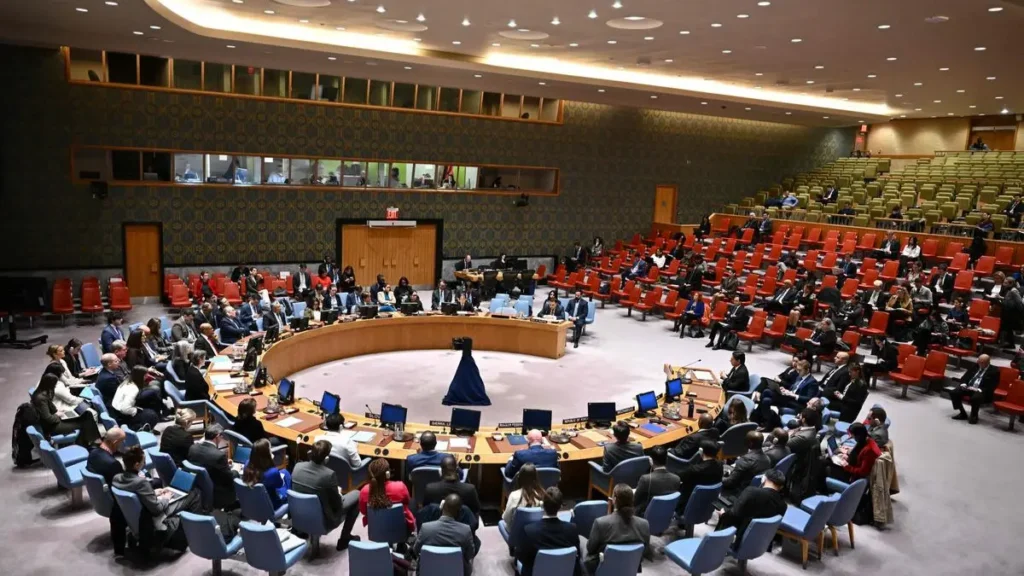Pakistan
WASHINGTON: On the first day of 2025, Pakistan begins its two-year term as a non-permanent member of the United Nations Security Council (UNSC), stepping into a complex global political environment.
This marks Pakistan’s eighth term on the UNSC, offering an important opportunity to shape global discussions on pivotal international issues, although it also presents several significant challenges.
Elected in June to replace Japan, Pakistan now holds one of the two Asia-Pacific seats on the UNSC. This term will be significant for Pakistan, as it will preside over the council in July, a crucial moment to influence the agenda and promote dialogue on key global issues.
In addition to its rotating presidency, Pakistan has secured a seat on the Islamic State and Al-Qaeda Sanctions Committee, a body responsible for designating individuals and groups associated with these organizations as terrorists and imposing related sanctions. This position gives Pakistan a valuable platform to highlight the cross-border terrorism issues stemming from Afghanistan, particularly those linked to groups associated with the Islamic State and Al-Qaeda.
Although only permanent members hold veto power within the council, non-permanent members, such as Pakistan, have substantial influence in committees related to terrorism sanctions, as decisions are made through consensus-building under established norms.
However, Pakistan’s ability to navigate its diplomatic priorities will be tested by the current fragmented state of global politics and increasing polarization within the council.
During its term, Pakistan will face several global and regional challenges. The situation in conflict zones such as Gaza, Kashmir, and Syria remains tense, and Pakistan’s long-standing support for Palestine and advocacy for Kashmir’s right to self-determination are expected to be key themes.
Pakistan’s UN Ambassador, Munir Akram, emphasized the urgent need to address the humanitarian crisis in Gaza, advocating for a ceasefire, unhindered humanitarian access, and accountability for civilian casualties.
While Pakistan reaffirms its commitment to a two-state solution, Ambassador Akram acknowledged the difficulties posed by divisions within the Security Council, where veto powers often derail consensus.
Similarly, Pakistan’s efforts to revive the Kashmir dispute, one of the longest-standing issues on the UNSC agenda, face obstacles due to India’s growing global influence and the international community’s muted response.
Pakistan’s position on the Syrian conflict highlights its support for Syria’s sovereignty and a peaceful, UN-facilitated political solution. However, with major powers controlling the conflict’s direction, Pakistan’s ability to influence the outcome remains limited.
Beyond regional concerns, Pakistan will also seek to advocate for reforms to make the UNSC more representative and accountable. Islamabad opposes adding new permanent members and instead favors expanding the non-permanent category to ensure more diverse representation.
As Ambassador Akram stated, “Regular elections and rotation are essential for a democratic council,” a position that aligns with the interests of smaller nations advocating for more equitable global governance.
This eighth term on the UNSC underscores Pakistan’s longstanding commitment to multilateralism and peacekeeping efforts. As one of five non-permanent members from the Organisation of Islamic Cooperation (OIC), Pakistan plays a significant role as a voice for the Muslim world on the global stage.
However, the polarization within the UNSC, along with the competing interests of major powers, will challenge OIC nations in advancing their priorities.
While Pakistan aims to leverage its position to highlight regional issues, such as Kashmir and Palestine, and address global concerns like terrorism, its success will depend on its diplomatic skill in navigating the complexities of a divided Security Council. This term presents an opportunity to enhance Pakistan’s standing on the world stage, but it also presents formidable challenges.
As Ambassador Akram concluded, “We look forward to working closely with other members of the UN Security Council and the broader UN membership to uphold the UN Charter and promote peace.” The next two years will determine how effectively Pakistan can turn these aspirations into meaningful achievements on the global stage.


